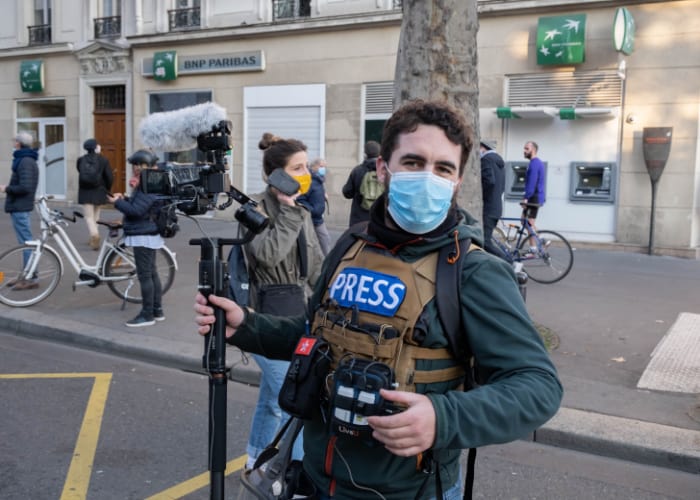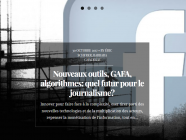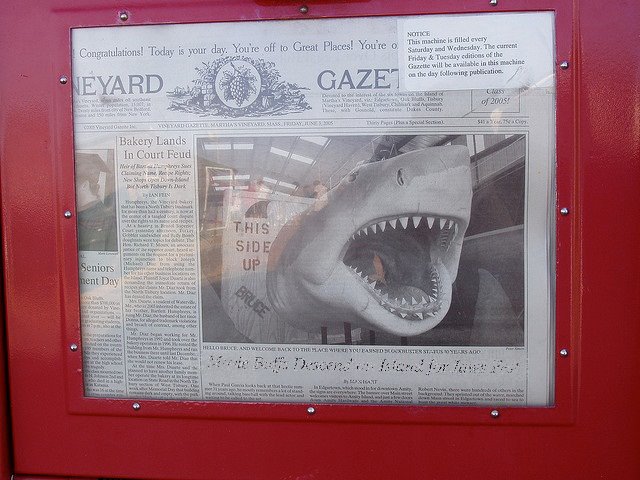
A journalist at a press freedom march in 2020. Image by Shutterstock.
In 2023, journalists and activists worldwide continued to fight for the freedom of the press. As we wrap up the year, one of the stories that still causes concern is the French weekly newspaper Le Journal du Dimanche (JDD)’s controversial appointment of Geoffroy Lejeune as their chief editor.
Lejeune was previously at the helm of Valeurs Actuelles. During his time there, the right-wing magazine was fined for racist hate speech for the publication of a fictional feature that represented French MP Danièle Obono dressed as an enslaved person. Lejeune also endorsed former journalist and far-right candidate Eric Zemmour during the 2022 presidential election campaign.
Vincent Bolloré, an industrialist and media magnate with ultra-conservative views, appointed Lejeune to the position after acquiring JDD, causing widespread concerns. Journalists, government ministers, academics and NGOs, such as Reporters Without Borders, were among those voicing their fears.
Protest
In June this year, more than four hundred academics, economists, cultural figures and left-leaning politicians signed an open letter – published by Le Monde, France’s biggest newspaper. In it, they declared: “For the first time in France since the Liberation, a large national news outlet will be run by a far-right personality.”
They described the appointment as a “dangerous precedent which concerns us all”. In June, journalists at JDD decided to walk out. Their strike lasted for 40 days, the second-longest in French media history.
What is particularly concerning is that Bolloré’s controversial appointment is just part of his tightening stranglehold over the French media. Through his majority stake in Lagardère – a global conglomerate with a publishing arm – Bolloré has also acquired weekly magazine Paris Match and radio station Europe 1.
In 2016, when he took over I-Télé, a television channel now known as CNews, journalists went on strike for 31 days, demanding editorial independence from their new majority shareholder. Eventually, more than 100 employees left the channel, which is now often compared to Fox News in the US.
Fears of a far-right drift
In their statement announcing the end of the strike in August this year, the union representing JDD staff warned that though they had not won against their shareholder, Lejeune would “face an empty newsroom”. In fact, two-thirds of the workforce left immediately, concerned that their newspaper, once known for its high-profile political interviews and moderate editorial line, would become a far-right outlet. By early October, more than 90% of the newsroom staff had resigned or were in the process of leaving.
Lejeune’s nomination came amid enduring concerns about the lack of independence and increased polarisation of the French media, with a handful of industrialists owning most legacy news outlets and TV channels. These include Bernard Arnault (Le Parisien, Les Échos), Charles Edelstenne and the Dassault family (Le Figaro), Patrick Drahi (Libération), Vincent Bolloré (JDD, Europe 1, CNews, Paris-Match), Xavier Niel and Matthieu Pigasse (Le Monde) and Martin Bouygues (Groupe TF1).
For journalists, these economic and political pressures not only threaten the freedom of the press but also undermine its quality. According to a journalist at Le Monde, who wishes to remain anonymous, “there used to be a real attachment to journalistic ethics; this is being undermined by increasing consanguinity in the press”.
Meanwhile, an editor at L’Humanité newspaper pointed to a fractured media ecosystem, where smaller outlets struggle to compete with larger news organisations: “Nowadays, any information is worth as much as any other. And a certain number of people do not have access to quality information and do not have the means to buy newspapers. On CNews, extremists hold centre stage and, therefore, no matter what we do, we are not heard. (…) What we lack today is the audience, and with a newspaper at €2.40, it’s difficult. It’s not going to get better.”
Public consultations
The ongoing situation at JDD has cast new light on a recent initiative, the ‘Etats généraux de l’information’ (Estates General of Information). Announced by President Emmanuel Macron in 2022 and launched in October this year, this series of public consultations is led by an independent committee. It aims to put forward proposals to foster pluralism, quality of information and editorial autonomy in the media. However, the initiative, which will run until the summer of 2024, is already facing criticism. Online investigative newspaper Mediapart has expressed concerns about the hearings’ lack of political independence, which they say defeats their purpose.
Opinions expressed on this website are those of the authors alone and do not necessarily reflect or represent the views, policies or positions of the EJO or the organisations with which they are affiliated.
If you liked this story, you may also be interested in: The exiles fighting for transparency and an end to corruption in Russia
Tags: French Media, Le Journal du Dimanche, Press freedom in France, Reporters Sans Frontiers













































